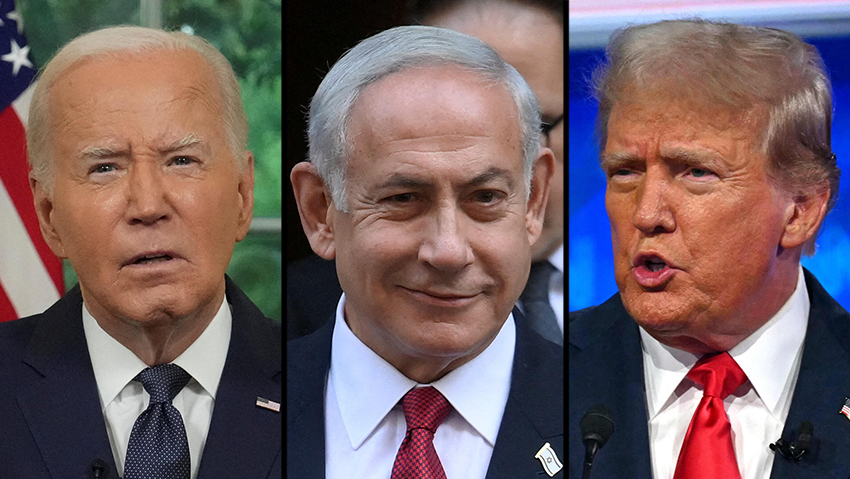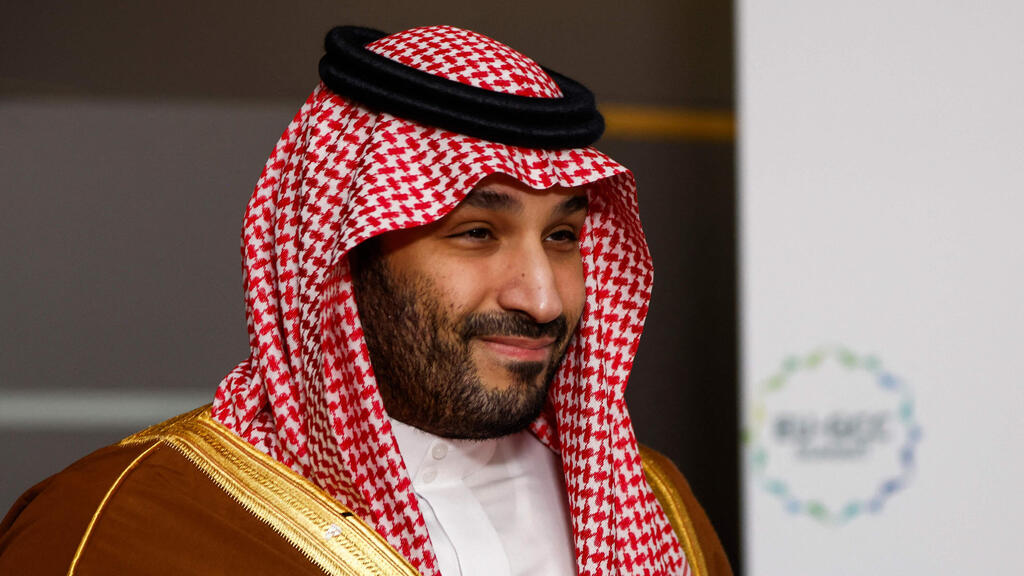Getting your Trinity Audio player ready...
Donald Trump will be the next president of the United States, but until his inauguration on January 20, Joe Biden and his vice president, Kamala Harris, will continue in office. For Israel and the world, this means Biden will still manage U.S. domestic and foreign policy in the coming months.
During this time, Israel will need to align as closely as possible with its global ally—both a partner and a power that often shapes its military actions and internal affairs. It’s therefore crucial to assess Biden’s likely policy moves as his term winds down.
3 View gallery


US President Joe Biden, Prime Minister Benjamin Netanyahu and US President-elect Donald Trump
(Photo: Andrew Caballero-Reynolds/AFP, Reuters/Erin Schaff)
Domestically, Israel faces heightened social and political tensions, worsened by the recent dismissal of Defense Minister Yoav Gallant. The ongoing, albeit slowly waning, war; unresolved issue of hostages with no clear plan for their release; and waning international legitimacy all compel Israel to lean heavily on the U.S., staying receptive to its advice and demands.
After Harris’ defeat, Biden will likely take the reins more decisively, free from campaign constraints—no longer needing to appeal to Jewish or Muslim voters, nor beholden to the progressive wing that pressured him to adopt a harsher stance on Israel. He will likely aim to leave a legacy, especially in the Middle East, as someone who ended wars in Gaza and Lebanon, assuaged Palestinian suffering and deterred Iran. Biden is also expected to support Ukraine as much as possible, anticipating Trump might shift U.S. policy in ways favorable to Russian President Vladimir Putin.
Gallant’s absence will likely strain security relations between Israel and the U.S. Biden and his administration, who have little trust in Prime Minister Benjamin Netanyahu and make no secret of their animus toward him, may struggle to communicate and coordinate on sensitive defense and diplomatic issues.
The administration will likely demand that Israel significantly boost humanitarian aid into Gaza, scale back military operations in northern Gaza and agree to a new governing framework for Gaza that, at least officially, includes representatives from Palestinian Authority Chairman Mahmoud Abbas’ administration. Without this arrangement, regional partners like Jordan, Egypt, the UAE and Saudi Arabia are unlikely to participate in civilian administration or peacekeeping efforts in Gaza or contribute financially to reconstruction.
Netanyahu may find these demands hard to stomach, fearing they could pave the way for a Palestinian state in the West Bank, Gaza and East Jerusalem. His coalition partners, such as Finance Minister Bezalel Smotrich and National Security Minister Itamar Ben-Gvir, might also resist these conditions.
The issue of the hostages will likely be a key point of contention. Biden may push hard for their release, aiming to mark it as a crowning achievement of his final days in office, possibly urging Netanyahu, now also acting as defense minister, to end the war.
On one issue, there will likely be no disagreement: Biden will provide Israel with all the protection and assistance it needs against Iran, possibly even offensive support if Tehran seeks to exploit Israel’s internal discord.
Israel’s new defense minister, Israel Katz, will have little real influence—partly due to his limited background on these issues, as seen during his previous role as foreign minister, which he primarily managed through social media. Israel’s foreign policy has been directed by Netanyahu and Strategic Affairs Minister Ron Dermer, with Netanyahu now likely managing defense matters as well, potentially clashing with the U.S.
In a joint letter, U.S. Defense Secretary Lloyd Austin and Secretary of State Antony Blinken recently called on Israel to raise the number of trucks delivering aid to Gaza to hundreds daily. With the 30-day deadline for compliance fast approaching, the U.S. may soon consider withholding arms shipments or other military equipment, as mandated by U.S. aid law.
A Trump term without Jared Kushner
It’s difficult to predict Trump’s policy agenda, given his erratic nature. Based on past behavior and statements, however, he’s likely to push for sweeping changes to U.S. governance aimed at consolidating presidential power across all branches, weakening the checks and balances enshrined in the U.S. Constitution to maintain separation of powers.
Trump has indicated his intention to pursue a political overhaul in the U.S. similar to what Netanyahu seeks in Israel, and such a plan would not proceed without opposition. Recently, the U.S. has been split into two camps: one dissatisfied with the current system and supportive of Trump, and the other committed to preserving the status quo, seeking reform from within. The clash between these two factions will be fierce, inevitably leading the U.S. to focus more inwardly—fueling Trump’s main foreign policy theme: isolationism. Trump has expressed a preference for the U.S. to avoid entanglements in foreign conflicts and believes it should focus on its own affairs rather than spend resources on foreign aid.
Trump has also mentioned wanting a swift end to conflicts in the Middle East, potentially pressing Netanyahu to adopt a similar stance without allowing flexibility. While Trump may continue supporting Israel, it will likely be with more limited financial aid than before.
During his first term, he was advised by his daughter Ivanka and, more significantly, by his Jewish son-in-law, Jared Kushner, who played a major role in what Israel considers achievements—such as the Abraham Accords, the relocation of the U.S. Embassy to Jerusalem and recognition of the Golan Heights.
However, after the January 6, 2021, Capitol riot, Kushner and Ivanka withdrew from Trump’s political circles, moving to a private estate in Miami, with Ivanka declining to comment on her father’s recent campaign. Although both joined Trump on stage after his recent victory, they’ve explicitly stated they won’t be involved in his administration—an unfortunate loss for Israel, as Kushner’s influence in the Middle East was significant.
Iran and Saudi Arabia’s potential moves
Israel can anticipate renewed support at the United Nations and diplomatic backing from a Trump administration that it didn’t see with Biden. Iran’s leaders, who fear Trump and the sanctions he may impose, are likely unsettled by his return. They also know Trump’s impulsive nature and recognize he might, in certain circumstances, resort to military force against Iran.
From Tehran’s perspective, Trump’s win dashes hopes for improved U.S.-Iran relations and the economic benefits that President Masoud Pezeshkian seeks. Trump’s Middle East advisor recently suggested pursuing a “new nuclear deal,” though he didn’t provide details.
Iran’s retaliation against Israel may now intensify, as Supreme Leader Ali Khamenei previously held off on any action that might have bolstered Trump’s campaign. Now that Trump has won, Iran may rethink its approach, acting more cautiously, yet possibly accelerating its nuclear program to deter the U.S., much like North Korea, which has achieved a unique position of immunity and intimidation.
For Sunni Gulf leaders, especially Saudi Crown Prince Mohammed bin Salman, Trump’s win is likely a relief, but they remain cautious, aware of Trump’s isolationism and reluctance to engage militarily in the region. They know that Trump will not actively protect them from Iran, as evidenced in 2019 when Iran disrupted Saudi oil production without facing a strong U.S. response.
During Trump’s term, Gulf nations will likely avoid antagonizing Iran and may withhold support from Israel in any plans to establish a new governing body in Gaza, unless Trump guarantees substantial backing.
As for Israel, Trump and Netanyahu are expected to set aside the tensions that arose at the end of Trump’s previous term in 2021. Netanyahu will likely seek Trump’s favor and avoid confrontations. During Trump’s first six months, as he focuses on forming his administration, Netanyahu may take the opportunity to strengthen ties with the U.S. and earn the new president’s trust.
If Biden cannot help Israel bring an end to the war before January 20, Israel may have to rely heavily on itself regarding hostages, any potential cease-fire arrangements in Gaza and Lebanon and, of course, Iran. Only around May or June of 2025 will it become clearer what Trump’s new administration means for Israel, the war and the Middle East.
Get the Ynetnews app on your smartphone:




